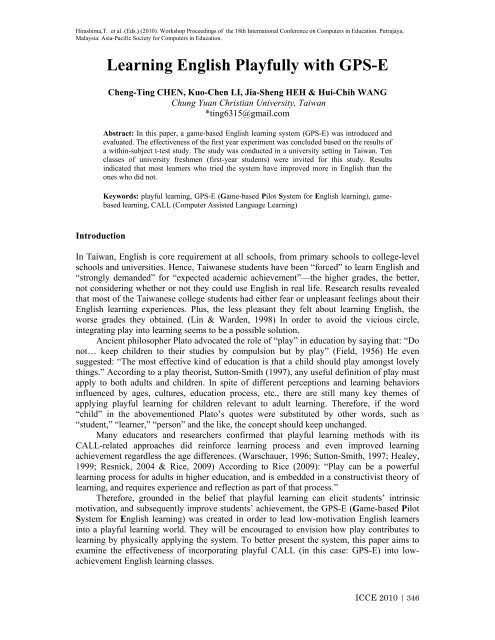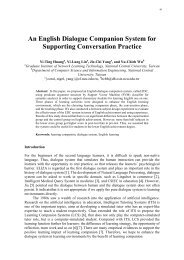ICCE2010 Workshop Proceedings - APSCE Asia-Pacific Society for ...
ICCE2010 Workshop Proceedings - APSCE Asia-Pacific Society for ...
ICCE2010 Workshop Proceedings - APSCE Asia-Pacific Society for ...
You also want an ePaper? Increase the reach of your titles
YUMPU automatically turns print PDFs into web optimized ePapers that Google loves.
Hirashima,T. et al. (Eds.) (2010). <strong>Workshop</strong> <strong>Proceedings</strong> of the 18th International Conference on Computers in Education. Putrajaya,<br />
Malaysia: <strong>Asia</strong>-<strong>Pacific</strong> <strong>Society</strong> <strong>for</strong> Computers in Education.<br />
Introduction<br />
Learning English Playfully with GPS-E<br />
Cheng-Ting CHEN, Kuo-Chen LI, Jia-Sheng HEH & Hui-Chih WANG<br />
Chung Yuan Christian University, Taiwan<br />
*ting6315@gmail.com<br />
Abstract: In this paper, a game-based English learning system (GPS-E) was introduced and<br />
evaluated. The effectiveness of the first year experiment was concluded based on the results of<br />
a within-subject t-test study. The study was conducted in a university setting in Taiwan. Ten<br />
classes of university freshmen (first-year students) were invited <strong>for</strong> this study. Results<br />
indicated that most learners who tried the system have improved more in English than the<br />
ones who did not.<br />
Keywords: playful learning, GPS-E (Game-based Pilot System <strong>for</strong> English learning), gamebased<br />
learning, CALL (Computer Assisted Language Learning)<br />
In Taiwan, English is core requirement at all schools, from primary schools to college-level<br />
schools and universities. Hence, Taiwanese students have been “<strong>for</strong>ced” to learn English and<br />
“strongly demanded” <strong>for</strong> “expected academic achievement”—the higher grades, the better,<br />
not considering whether or not they could use English in real life. Research results revealed<br />
that most of the Taiwanese college students had either fear or unpleasant feelings about their<br />
English learning experiences. Plus, the less pleasant they felt about learning English, the<br />
worse grades they obtained. (Lin & Warden, 1998) In order to avoid the vicious circle,<br />
integrating play into learning seems to be a possible solution.<br />
Ancient philosopher Plato advocated the role of “play” in education by saying that: “Do<br />
not… keep children to their studies by compulsion but by play” (Field, 1956) He even<br />
suggested: “The most effective kind of education is that a child should play amongst lovely<br />
things.” According to a play theorist, Sutton-Smith (1997), any useful definition of play must<br />
apply to both adults and children. In spite of different perceptions and learning behaviors<br />
influenced by ages, cultures, education process, etc., there are still many key themes of<br />
applying playful learning <strong>for</strong> children relevant to adult learning. There<strong>for</strong>e, if the word<br />
“child” in the abovementioned Plato’s quotes were substituted by other words, such as<br />
“student,” “learner,” “person” and the like, the concept should keep unchanged.<br />
Many educators and researchers confirmed that playful learning methods with its<br />
CALL-related approaches did rein<strong>for</strong>ce learning process and even improved learning<br />
achievement regardless the age differences. (Warschauer, 1996; Sutton-Smith, 1997; Healey,<br />
1999; Resnick, 2004 & Rice, 2009) According to Rice (2009): “Play can be a powerful<br />
learning process <strong>for</strong> adults in higher education, and is embedded in a constructivist theory of<br />
learning, and requires experience and reflection as part of that process.”<br />
There<strong>for</strong>e, grounded in the belief that playful learning can elicit students’ intrinsic<br />
motivation, and subsequently improve students’ achievement, the GPS-E (Game-based Pilot<br />
System <strong>for</strong> English learning) was created in order to lead low-motivation English learners<br />
into a playful learning world. They will be encouraged to envision how play contributes to<br />
learning by physically applying the system. To better present the system, this paper aims to<br />
examine the effectiveness of incorporating playful CALL (in this case: GPS-E) into lowachievement<br />
English learning classes.<br />
ICCE 2010 | 346



